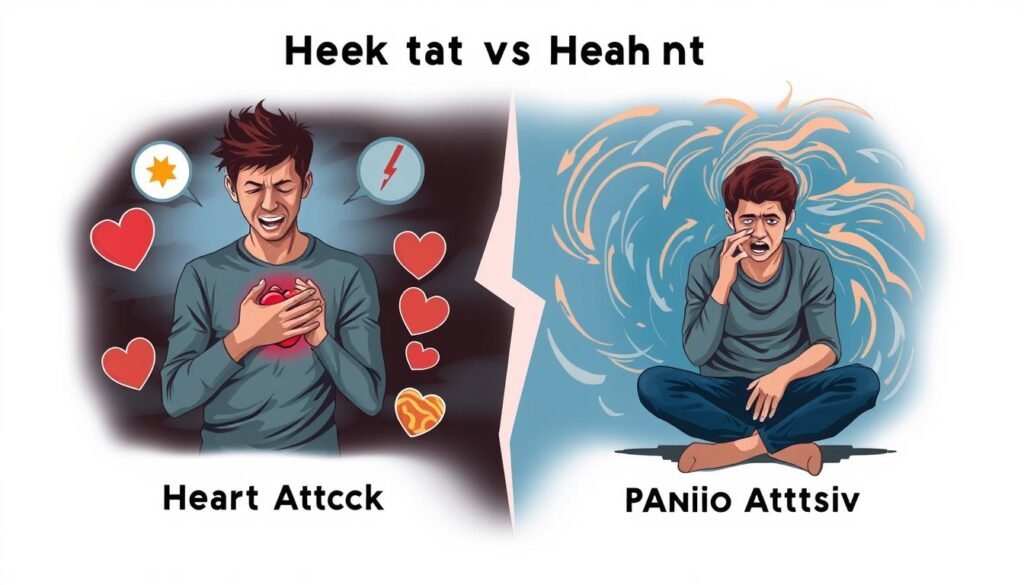About 11 percent of people will face a general anxiety disorder during their lives. This fact is important because anxiety can have symptoms like those of a heart attack. These include chest pain and fast heart rates. As more people experience anxiety, it’s key to recognize these signs and know when to seek help.
Anxiety and heart attacks have similar symptoms, making it hard to tell them apart. It’s vital to know the difference to calm fears and get the right treatment. We’ll look into these similarities to help you tell an anxiety attack from a heart attack.
Key Takeaways
- Anxiety disorders affect around 18.1% of the U.S. population annually.
- Misdiagnosis is common due to similar symptoms between anxiety and heart attacks.
- Recognizing early signs is crucial for effective treatment and prevention.
- Panic attacks, while less common, can also mimic heart-related issues.
- Proper assessment can help distinguish anxiety from heart complications.
Understanding Anxiety and Heart Attacks
Anxiety is a common mental health issue that shows up as too much fear or worry. It can change how we go about our day and feel. Many people dealing with anxiety also have physical symptoms similar to those of a heart attack. This similarity can make it hard to tell them apart, so it’s important to know the symptoms well.
A heart attack happens when the blood flow to a part of the heart is blocked, often by a clot. It is very serious and needs quick medical help. Knowing the difference between signs of anxiety and a heart attack could save a life.
Symptoms of anxiety can include:
- Chest pain that might feel sharp
- A heartbeat that’s faster than usual
- Having trouble breathing
- Feeling really scared or worried
On the other side, heart attack signs are more like:
- Chest pain or pressure, mainly on the left or under the chest bone
- Feeling uncomfortable in arms, back, neck, jaw, or stomach
- Breaking out in cold sweats
- Feeling dizzy or light-headed
It’s key to know these symptoms to tell anxiety apart from a heart attack, especially in stressful moments. Panic attacks come on fast, often because of stress, but don’t have a clear cause like heart attacks do. Symptoms of a panic attack usually reach their worst quickly and can go away soon after. But heart attack symptoms tend to start slowly and get worse over time. Understanding this can help people get the right medical help when they need it.
What is a Panic Attack?
A panic attack brings on sudden intense fear. This fear causes both physical and emotional problems. It’s important to know what it is. This helps to tell it apart from other health issues, like heart attacks. When someone has a panic attack, they might feel like something very bad is going to happen.
Definition and Symptoms
A panic attack starts with sudden, scary fear. The common signs are:
- Chest pain
- Rapid heartbeat
- Shortness of breath
- Dizziness or lightheadedness
- Chills or hot flashes
- Feelings of unreality or detachment
A panic attack usually lasts a few minutes to an hour. But, it can make someone feel worn out for hours after. Even though chest pain might make you think it’s a heart attack, the pain from a panic attack is different. It doesn’t spread like the pain from a heart attack does.
Duration and Triggers
Panic attacks can be short or long. Some last just a few minutes, while others can go on for hours. Things that often start them include:
- Stressful life events
- Major transitions
- Past traumatic experiences
About 30-50% of people might also have panic attacks at night. Knowing what causes panic attacks is key to dealing with them. Knowing how a panic attack is different from a heart attack can lower worry. This means people can get the right help faster.
What is a Heart Attack?
A heart attack happens when the heart’s blood flow is blocked. This leads to serious health problems. It can cause chest pain and other signs that need quick action.
Knowing these signs is key to getting help fast.
Definition and Symptoms
Chest pain is a common sign of a heart attack. It might feel like pressure or squeezing. This pain can spread to the arm, jaw, or back.
Other signs include shortness of breath, feeling sick, and sweating. Not everyone gets chest pain. In fact, some people don’t feel pain at all.
Common Risk Factors
It’s important to know what increases heart attack risk. Common risks include:
| Risk Factor | Impact |
|---|---|
| Smoking | Significantly increases the risk of heart disease |
| High Cholesterol | Contributes to arterial plaque buildup |
| Diabetes | Increases the likelihood of cardiovascular problems |
| Hypertension | Places strain on the heart and arteries |
Anxiety vs. Heart Attack: Similar Symptoms
Knowing how anxiety and heart attacks overlap is key. Both can cause chest pain and shortness of breath. This can lead to confusion about what you might be experiencing. Recognizing these similar symptoms ensures you get the right care quickly.
Chest Pain
Chest pain can be a scary sign of a heart problem. During a heart attack, it feels like pressure or tightness. This pain can spread to the jaw, neck, or back. Panic attacks can cause similar chest pain, but it doesn’t last long. It usually goes away in a few minutes. Knowing the differences and getting help fast can save lives. It’s crucial to see a doctor right away to figure out what you’re dealing with.
Shortness of Breath
Feeling out of breath can happen with anxiety or a heart attack. If it’s a heart attack, the struggle to breathe can start slowly or all of a sudden. You might also sweat or feel dizzy. With panic attacks, you’ll want to breathe deeply out of nowhere. You might also feel your heart racing. Knowing these signs helps you decide when to get help. If heart trouble seems possible, call a doctor or dial emergency services right away.
Panic and Fear Responses
Feeling really scared can make your body react in big ways. During a panic attack, this fear can make you have symptoms like a heart attack. This makes the situation even scarier. Understanding these emotional responses is key. It helps you know when to look for help. Taking care of your mental and physical health is very important. You can learn more about these differences by checking out how to spot whether it’s a heart or panic attack here.

| Symptom | Anxiety Panic Attack |
Heart Attack |
|---|---|---|
| Chest Pain | Sharp, quick; resolves in minutes | Pressure, tightness; may radiate |
| Shortness of Breath | Sudden urge to breathe; panic-driven | Gradual or sudden onset; distressful |
| Panic Response | Intense fear, rapid heartbeat | Accompanied by sweating, nausea |
How to Differentiate Between the Two
Knowing how anxiety attacks differ from heart attacks is crucial. It helps respond quickly and correctly. By looking at how symptoms start, how long they last, and what usually causes them, we can tell these two apart more easily.
Onset of Symptoms
The onset
Chest Pain: Understanding the Differences
Knowing the type and location of chest pain is key. Heart attack pain is often described as a pressure or squeezing sensation. On the other hand, pain from a panic attack feels sharp or shooting. It’s important to tell these apart to handle emergencies or manage anxiety symptoms.
Type of Pain
Chest pain varies with its cause. Heart attacks usually cause pressure or squeezing in the chest. This pain can last and may spread to arms, jaw, or back. Unlike heart pain, panic-related chest pain is sharp or shooting and fades after a few minutes. Panic attacks might follow intense stress, highlighting the need to understand pain context.
Location of Pain
Where chest pain happens can help identify its cause. Heart attack pain often targets the left side or beneath the breastbone. Such symptoms might grow worse, pointing to a heart issue. Conversely, chest pain from panic attacks has no fixed spot and can shift. This variance, with emotional stress, can confuse diagnosis. Identifying these differences is vital in understanding anxiety vs heart attack scenarios and when to seek help.
When to Seek Medical Attention
Knowing when to seek medical help can save lives. There are clear signs that someone might be having a heart attack. It’s crucial to recognize and act on these signs quickly.
Being aware is key, not just for the person in danger but also for their family and friends.
Signs of a Heart Attack
Heart attacks show through various symptoms. The most usual signs are:
- Uncomfortable pressure, squeezing, or pain in the center of the chest
- Pain that spreads to the shoulders, neck, jaw, arms, or back
- Shortness of breath, with or without chest discomfort
- Other signs like feeling dizzy, nauseous, or sweating
Immediate medical help is a must for these signs. Quick action can greatly improve recovery chances.
Recognizing Panic Attack Symptoms
Panic attack symptoms are intense but not deadly. They include:
- Fast heartbeat or heart pounding
- Sweating and shaking
- Feeling like you can’t breathe or you’re choking
- A feeling of extreme fear or losing control
For those with frequent panic attacks, knowing these signs is the first step. It leads to better anxiety management and steps toward healing.

Treatment for Panic Attacks
Panic attacks can deeply impact a person’s life. Knowing how to manage them is crucial for improving well-being. Treatments include cognitive behavioral therapy and medication management. Together, they offer relief.
Cognitive Behavioral Therapy
Cognitive behavioral therapy (CBT) greatly helps with panic attacks. It’s a therapy that changes negative thoughts to reduce fear and anxiety. Many see improvements after a few months of regular sessions.
CBT teaches ways to handle stressful thoughts or situations. This can prevent panic attacks from starting.
Medication Management
Sometimes, medication is needed for panic attack symptoms. SSRIs like fluoxetine (Prozac), paroxetine (Paxil, Pexeva), and sertraline (Zoloft) are often chosen for their safety. Another approved option is Venlafaxine (Effexor XR).
For quick relief, benzodiazepines such as alprazolam (Xanax) and clonazepam (Klonopin) are used. But, they’re for short-term because of dependence risks. Always talk to a doctor to find the best treatment and check medication interactions.
Treatment for Heart Attacks
Quick and effective action is necessary to treat heart attacks. Immediate help saves the heart muscle from serious damage. Knowing what to do can greatly help patients survive heart attacks.
Emergency Response
Quick action is key when heart attack symptoms show up. The first thing to do is call 911. This ensures the patient gets urgent care. Doing CPR correctly increases chances of survival. It’s important to do hands-only CPR at a certain speed until help arrives. If a health pro says it’s okay, taking aspirin quickly might lessen heart damage. The sooner defibrillation starts, the better the survival chances.
Long-term Management
To avoid more heart attacks, it’s important to follow a long-term care plan. There are several key steps:
- Lifestyle Changes: Eating healthy, staying active, and stopping smoking helps a lot.
- Monitoring Risk Factors: Watching blood pressure, cholesterol, and diabetes is vital. Good control can cut heart attack risks by half.
- Psychoeducation: Knowing the difference between anxiety and heart attack symptoms is important. It helps both the mind and heart stay healthy.
It’s key to understand how anxiety and heart health affect each other. To learn more about handling panic attacks, see this support resource.
| Management Strategy | Details |
|---|---|
| Lifestyle Changes | Healthy eating, regular exercise, smoking cessation |
| Risk Monitoring | Regular check-ups for blood pressure and cholesterol |
| Psychoeducation | Understanding anxiety symptoms vs heart attack symptoms |
The Importance of Medical Evaluations
Medical evaluations are key to telling anxiety from heart issues. This ensures patients get care that fits their symptoms. Doctors play a huge role here. They check each patient carefully and suggest needed tests. Getting the right diagnosis often means doing a variety of tests.
Role of Healthcare Professionals
Medical pros start the evaluation process. They listen to what patients say, look at their health past, and figure out how urgent the situation is. It’s important to guide patients rightly. This matters a lot when symptoms could mean heart problems or anxiety. Such assessments are crucial for making the right treatment plan.
Diagnostic Tests Used
Diagnostic tests help check a patient’s health. Some common tests are:
| Test Type | Purpose | Example Outcomes |
|---|---|---|
| EKG (Electrocardiogram) | Measures heart’s electrical activity | Identifies irregular heart rhythms |
| Blood Tests | Checks for heart-related enzymes | Detects heart damage or risk markers |
| Stress Tests | Analyzes heart performance under stress | Assesses exercise tolerance and detects blockages |
Doing these tests often can find heart issues early. This leads to quick action and treatment. When doctors use smart approaches, it helps patients a lot. It makes treatment better and keeps patients healthy.
Anxiety and Heart Health
Anxiety deeply affects heart health, increasing cardiovascular problem risks. Studies show those with anxiety disorders are 26% more likely to get heart disease. This includes coronary artery disease and heart failure. So, managing anxiety is vital for protecting your heart and lowering these risks.
Impact of Anxiety on the Heart
Research shows a strong connection between anxiety and heart issues. People with anxiety tend to face cardiovascular risks sooner. For example, those with anxiety or depression might have health problems six months earlier than others. Anxiety also leads to bad habits that hurt the heart, like smoking or eating poorly.
Managing Anxiety for Better Heart Health
To better heart health, managing anxiety is key. Some options are:
- Cognitive Behavioral Therapy (CBT): This treatment changes thought patterns and confronts fears.
- Regular Physical Activity: Doing moderate exercise for 150 minutes a week helps both heart and mental health.
- Medication Management: SSRIs are often chosen first for those with anxiety and heart issues.
Using these approaches to tackle anxiety can help cut heart disease risk. This leads to better health overall and improved cardiovascular care.

Preventing Heart Attacks
To stop heart attacks, taking active steps is key. People can cut their risk by knowing and handling risk factors well. Making lifestyle changes and managing risks are at the heart of good heart health.
Risk Factor Management
It’s crucial to control risk factors to avoid heart attacks. Important steps include:
- Monitoring and managing blood pressure levels
- Maintaining healthy cholesterol levels
- Managing diabetes effectively
- Avoiding the use of tobacco products
- Recognizing and addressing chronic stress
Working on these can lead to a healthier heart and a lower chance of heart problems. Getting regular check-ups helps keep track of health. It lets people adjust their lifestyle to lower risks. For more on stopping heart disease, see these detailed guides.
Lifestyle Changes
Making good lifestyle changes is key for a healthy heart. Some good strategies are:
- Adopting a diet full of fruits, veggies, whole grains, and lean proteins
- Doing physical activities like walking, running, or biking often
- Not drinking too much alcohol
- Getting enough sleep and keeping stress low
- Stopping smoking and staying away from secondhand smoke
Such changes can greatly improve health and lower heart attack risks. Understanding how daily habits affect heart health is vital. Making the right choices helps with heart health and leads to a happier life.
Conclusion
Understanding the difference between anxiety and heart attack symptoms is key to wellbeing. It’s crucial to recognize each sign to know how to react when symptoms arise. Panic attacks bring sharp, brief pain and intense fear, which shouldn’t be ignored.
People under 50 with panic disorder may face a higher heart disease risk. Recent studies back this up, making it important to get help if you’re unsure. Treating anxiety well and changing your lifestyle can cut down these risks, showing why acting early matters for both mind and body health.
Being proactive about your health helps lead to better results. This means managing anxiety, spotting symptoms early, and seeking advice when needed. By doing so, you’re taking big steps towards living a healthier and more joyful life.